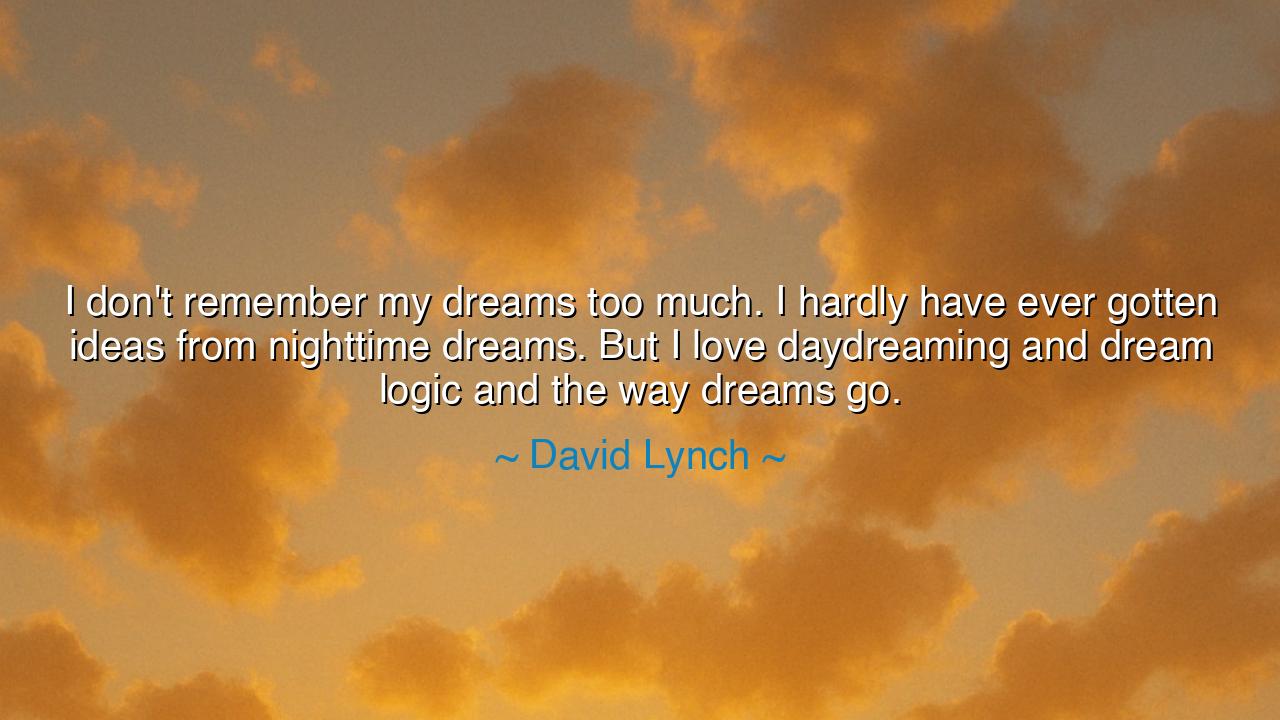
I don't remember my dreams too much. I hardly have ever gotten
I don't remember my dreams too much. I hardly have ever gotten ideas from nighttime dreams. But I love daydreaming and dream logic and the way dreams go.






The visionary filmmaker and artist David Lynch, whose works blur the border between the ordinary and the surreal, once said: “I don't remember my dreams too much. I hardly have ever gotten ideas from nighttime dreams. But I love daydreaming and dream logic and the way dreams go.” These words, spoken by a master of the subconscious image, reveal a deep truth about the creative spirit — that it does not sleep when the body sleeps, but awakens in the daylight of imagination. Lynch, known for the strange beauty of Twin Peaks and the haunting mystery of Mulholland Drive, was not a collector of dreams, but an architect of them. He teaches that true inspiration does not always descend from the darkness of night, but can rise in the full light of consciousness, when the mind dares to wander freely beyond reason.
The ancients knew that the dream world was sacred — a realm where gods spoke in symbols and visions carried messages of fate. Yet Lynch speaks not of nighttime dreams, but of something subtler: the daydream, the waking dream, born not of sleep, but of surrender. He honors that state of mind where logic loosens its grip and imagination flows without fear or direction — where thoughts drift like clouds, and meaning takes shape from emotion rather than analysis. This is what he calls “dream logic” — the mysterious order that feels irrational to the intellect, yet perfectly true to the heart. For in the land of dreams, a door may open to memory, a shadow may reveal love, and the impossible may make perfect sense.
To understand the wisdom in his words, we must remember that David Lynch is not a dreamer lost in illusion, but a craftsman who shapes his visions into art. His films do not imitate dreams; they function like them. They follow the pathways of dream logic — where time bends, meaning dissolves, and emotion becomes reality. Lynch reminds us that this dreamlike way of seeing is not confined to the night — it is the birthright of every waking soul. We need not close our eyes to encounter mystery; it breathes around us always. To walk through life with the wonder of a dreamer is to see the sacred woven into the ordinary.
There is a lesson here that echoes across centuries. Leonardo da Vinci, that eternal student of nature, was known to drift into long moments of reverie, staring at clouds, at water, at cracks in a wall — and from those daydreams emerged ideas that would shape the world: inventions, paintings, designs of flight and war. He, too, understood the power of daydreaming, the art of seeing not what is, but what could be. When reason rests and curiosity awakes, the spirit glimpses deeper truths. The daydream, dismissed by the hurried and the practical, is in truth the cradle of creation.
Lynch’s reverence for “the way dreams go” reminds us that the universe itself moves with the rhythm of dream logic. Life is rarely linear. Our paths twist and turn; meanings appear after the fact; coincidences weave destinies unseen. The wise do not fight this mystery — they embrace it. To live as Lynch teaches is to trust the flow of inspiration, to welcome the irrational and the unknown as companions in creation. In this, he speaks like an ancient mystic, whispering that clarity is not always found in order, but often in chaos — that what seems strange may, in truth, be sacred.
And so, his words become not merely advice for artists, but for all who seek a fuller life. Do not fear the dreamer within you. Let your mind wander without goal, let your thoughts meander like rivers, let images and feelings rise without command. The world prizes control, but creation is born of surrender. The daydream is the bridge between the conscious and the divine — between the self that reasons and the self that feels. To cultivate it is to awaken the part of the soul that still remembers wonder.
Let this be the teaching, then: honor your daydreams, for they are the whispers of your deeper self. Do not wait for sleep to dream; dream awake. Let your thoughts wander through “dream logic,” for there you will find the colors of truth that reason cannot paint. Like Lynch, become an alchemist of imagination — one who shapes the unseen into form, who turns drifting visions into living art. For in a world obsessed with certainty, it is the dreamers, awake and unafraid, who will continue to see the infinite within the ordinary — and remind us all that the real world, too, is a dream waiting to be understood.






AAdministratorAdministrator
Welcome, honored guests. Please leave a comment, we will respond soon